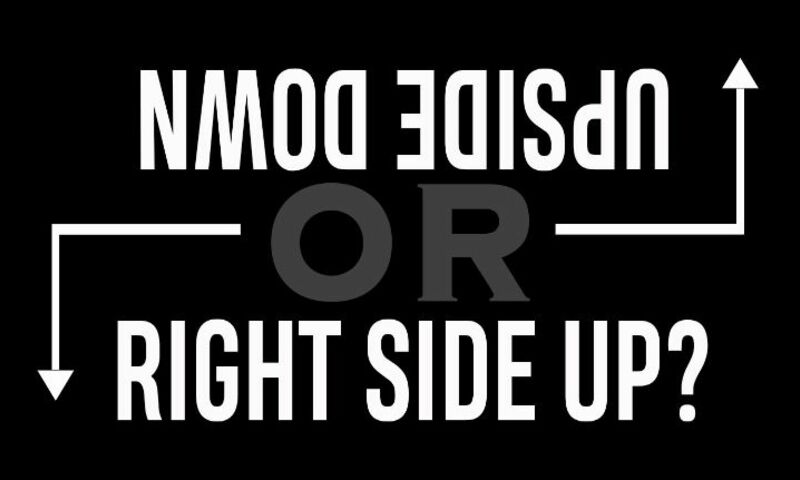How We Think and Talk About the Kingdom of God
Jesus did not come to turn the world upside down. How does that statement strike you? Does it resonate with your understanding of Jesus’ purpose in entering our earthly reality? If you are even cursorily familiar with evangelical lingo about the Kingdom of God, the statement should strike you as questionable, if not downright wrong. For decades, and in many contexts, we have been proclaiming that the inbreaking of the Kingdom of God through the life, death, resurrection, and ascension of Jesus was precisely for the purpose of turning the world upside down.
Here is how Donald Kraybill expresses the idea in the 25th-anniversary edition of his important and influential 1978 book, The Upside-Down Kingdom:
The kingdom of God announced by Jesus was a new order of things that looked upside-down in the midst of Palestinian culture in the first century. Moreover, the kingdom of God continues to have upside-down features as it breaks into diverse cultures around the world today [1].
More recently, Pastor Greg Laurie, in his book and Bible Study, Upside Down Living, unpacks Acts 17:6, the key passage for thinking about the Kingdom of God in upside-down terms, this way:
At one point, missionaries named Paul and Silas were talking about Jesus in a town in what is now Greece, and a furious mob complained to the officials of the town, “Those who have turned the world upside down have come here too” … What they meant was, “These troublemakers are disturbing the peace.” It was not a compliment. But for Paul and Silas it was high praise — turning the world upside down with the Gospel of Jesus is exactly what they wanted to do [2]. What concerns me [is that] we’re not making much of a disturbance anymore. Instead of the church turning the world upside down, my fear is that the world is turning the Church upside down [3].
These excerpts exemplify upside-down thinking about the Kingdom of God. And, in many respects, there is an element of truth to this way of thinking. But notice something vital about Acts 17:6. Those claiming that the followers of Jesus were turning the world upside down were not themselves citizens of the Kingdom of God. The idea that the Kingdom of God is an upside-down kingdom is from an outsider's perspective.
How We Should Think and Talk About the Kingdom of God
God's plan has always been to fully establish his kingdom on earth in the future, and in the present to have aspects of that future kingdom break into our reality now, with particular blessings on those who come to him in faith. Dallas Willard describes the Kingdom of God simply as that place, “where what he wants done is done” [4]. And the God-man, Jesus, is clear about what God wants to be done. Being that Jesus does only ever what his Father is doing (John 5:19), He is the powerful and authoritative voice to know what right-side up is, looks like, and how it functions best. In the fullness of time, he came (Gal. 4:4), invading human history as the Anointed One, the Divine Corrective who by God’s Spirit actualizes the Father’s unchanging original right-side-up design.
All of Jesus’ teachings, parables, and miracles reflect the right-side-up kingdom and the responsibility kingdom citizens exercise under his rule. His teachings were authoritative, not relying on other rabbis’ interpretations. His parables encouraged questions and were used as a measure to determine the listener’s heart for God’s Kingdom. An early parable Jesus told was of the four different soils. This story pictures varying heart postures of receptivity toward God’s Kingdom. Jesus pushed the envelope: Which type of soil, i.e., heart, do you have for God’s right-side-up Kingdom? The miracles Jesus performed demonstrated the compassion of God for sinners, outcasts, and diseased (Mark 1:41) and also evidenced his authority in the spiritual realm by demonstrating his authority in the physical realm. (Mark 2:10-11).
Every instance of Jesus’ show-and-tell life was always consistent with God’s perfect plan. When we let God have his way in words and deeds that reflect Jesus’ character, we give witness to right-side-up Kingdom life.
Why It Matters How We Think and Talk About the Kingdom of God
If it’s true that the Kingdom of God is an upside-down kingdom from the world’s perspective and that it is right-side up from God’s perspective, can’t we simply use both ideas and just be a little more careful about the context in which we use these descriptors? Perhaps. But we think there are some key reasons to shift the balance to using right-side-up language more often than we currently do.
For Christians, thinking of the world as right-side up, which is the logical understanding if the Kingdom of God is upside-down, can blind us to some, even many, of the world’s deceptions and temptations. Upside-down thinking looks for those things that are obviously wrong in the world, and seeks to turn them upside down. But this approach can assume that it is easy to assess and discern where something is wrong in the world, and often gravitates toward the issues and questions that most bother us.
In reality, the whole world is upside down, and we need to allow God's Kingdom purposes to penetrate our whole lives and thus impact as much of the world as possible with God's Kingdom values — to turn it right-side up. When our heart, mind, and will align with the Kingdom of God, we’re right-side up, not upside-down. Aligned with God’s right-side-up Kingdom is to be in step with his purposes of restoring and redeeming in whatever context or relationship for which we are uniquely ordained: family, community, organization etc.. And when Jesus followers bring goodness, truth, and beauty into the world, he is advancing the right-side-up Kingdom through us, not turning the world upside down. Of course, none of this individual or corporate work will be complete until Jesus returns, but it is the work we give ourselves to in all aspects of our lives until he does. As Spirit-led followers of this King of the right-side-up Kingdom, we will have an impact in this upside-down world only by the power of his Spirit.
For those who have yet to enter into a redeemed relationship with Jesus, this present world is their “normal.” And because it is “normal,” it convinces their minds and hearts completely, yet subtly, profoundly, yet superficially, that being in the world and of the world is acceptable. It is the mission of those who are citizens of the right-side-up Kingdom to lovingly and compassionately cause others to consider that the world they see as “normal” is actually upside down. God’s original design, both for them and for us — a design which is still in place and being actualized — should be proclaimed in word and deed as a striking alternative to the “normal,” an alternative that makes so much more sense because it is right-side up and not upside down.
Notes
[1] Donald B. Kraybill, The Upside-down Kingdom, 25th Anniversary Edition (Scottsday, PA: Herald Press, 2003), 9.
[2] Greg Laurie, Upside Down Living Bible Study: A Study from the Book of Acts (Colorado Springs, CO: NavPress, 2014), n.p.
[3] Greg Laurie, Upside Down Living: A Template for Changing the World and Ourselves from the Book of Acts (AllenDavid Books/ Kerygma Publishing, 2009), n.p. Greg Laurie preaches about turning the world right-side up, but he does so only in reference to Jesus’ reign in the future Millennial Kingdom. See “Turning the World Right-Side Up” YouTube, May 16, 2021, accessed August 27, 2022, https://www.youtube.com/watch?v=ICyAlD86KuQ.
[4] Dallas Willard, The Divine Conspiracy: Rediscovering our Hidden Life in God (New York, NY: HarperSanFrancisco, 1997), 25.
 Biola University
Biola University


.jpg)
.jpg)

